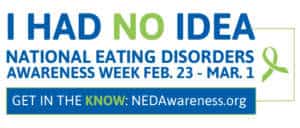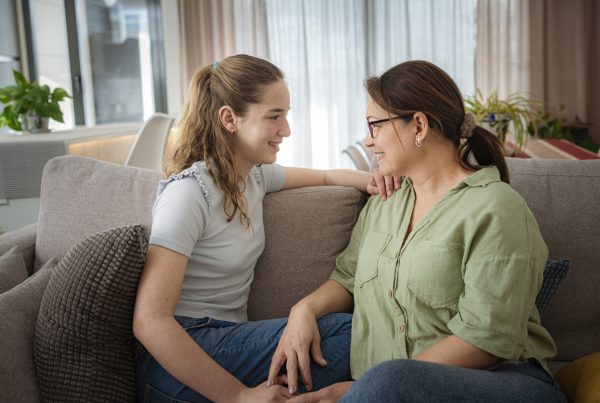Continuing our week of honoring Eating Disorder Awareness Week,  I spoke to Visions’ Michelle Gross, MA, LMFT who has specialized in the treatment of eating disorders for over 18 years. Her passion is in treating the eating disorder community both individuals, and their families. Eating Disorder Awareness is something we encourage and support via groups, individualized therapy, and nutritional support. I asked Michelle for some insight into what she tells families with a loved one who is suffering from an eating disorder or disordered eating behaviors. She says,
I spoke to Visions’ Michelle Gross, MA, LMFT who has specialized in the treatment of eating disorders for over 18 years. Her passion is in treating the eating disorder community both individuals, and their families. Eating Disorder Awareness is something we encourage and support via groups, individualized therapy, and nutritional support. I asked Michelle for some insight into what she tells families with a loved one who is suffering from an eating disorder or disordered eating behaviors. She says,
“When assisting a family who have just learned that their loved one is suffering from an eating disorder, I want them to know that eating disorders are a coping mechanism that tend to occur in individuals who suffer from anxiety and/or depression. Eating disorders numb pain (overeating), release feelings (purging), and create a feeling of control (counting calories). Eating disorders, although not always identical in form, tend to run in families. Family members need to know that the way in which they respond to their loved one is critical to the recovery process; however, they are not responsible for the development of the eating disorder itself. Eating disorders are an illness. Eating disorders are not about weight.”
Families who are confronted with this issue have to re-learn how to communicate with each other in a non-triggering way. I recently had to have a discussion with someone about their perpetual food talk and how triggering it was. Every meal was punctuated with negative commentary about weight gain, etc. So, eating with this person was becoming treacherous. Michelle Gross has wonderful insight and suggestions for situations just like this:
“It is important for family and friends to know how to be supportive. Unfortunately, the best of intentions to assist the eating disordered individual tend to backfire. Telling an anorexic that recently gained weight: ‘You look so much healthier,’ is easily misconstrued as being told one is ‘fat.’ Attempts to make sure an anorexic eats or a bulimic does not purge, create feelings of powerlessness that intensify the desire to feel in control by minimizing calories or purging. Innocently mentioning one’s own need to lose weight or recently enjoying a vigorous workout, leave the eating disordered individual feeling inadequate and more dissatisfied with herself. Loved one’s need to learn the ‘language’ spoken by the eating disordered individuals. Eating disorders are competitive.”
And what about triggers? Remember, what triggers one person may not trigger another, but some things are similar across the board. Michelle provides some salient advice here. If we begin to understand the psychological mechanisms of the eating disorder, our awareness and ability to support someone who is suffering increases. By opening our eyes, we can be supportive without judging the individual.
Michelle tells us that, “Family and friends also need to learn what triggers or intensifies eating disordered thoughts and behaviors. Shopping for clothes, going to restaurants, exercising to reduce stress, can all intensify the eating disorder. Eating disorders are reactive. The more one learns how their loved one’s eating triggers them, the more helpful one can be.”
Recovery is a family process, and that includes recovery from substance abuse, mental illness, eating disorders, or processing disorders. Treatment must include all facets of the family system. Learning how to do this is a process and a practice; and as Michelle illustrates, it is not one-sided affair:
“It is extremely valuable for family members to be part of the treatment. Family sessions in addition to the individual therapy offers all members the opportunity to learn how to be supportive, to share concerns in a controlled environment, and gives the eating disordered individual an opportunity to express their feelings in an appropriate way vs. through the eating disordered behaviors.”
We need to unite as a recovery community, championing Eating Disorder Awareness Week and encouraging others to do the same. We can facilitate supportive environments and spaces for healing so those suffering from an eating disorder can begin to recover and find freedom from the devastating anguish caused by their eating disorders.









